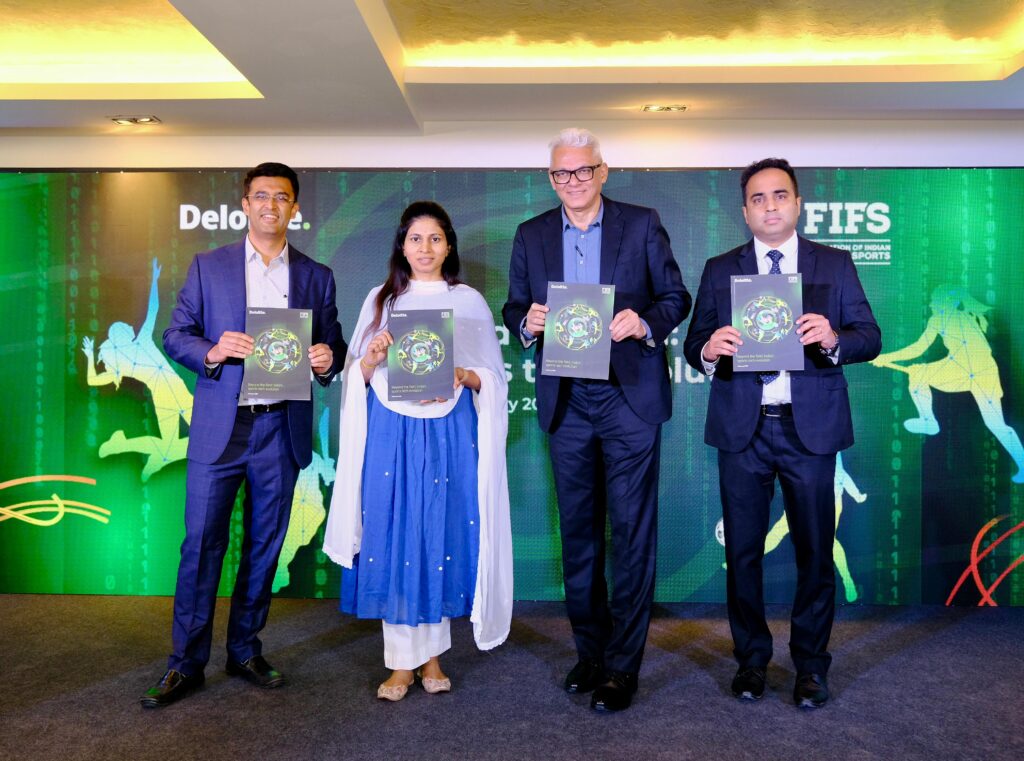
The Federation of Indian Fantasy Sports (FIFS), in collaboration with Deloitte, has released a report titled “Beyond the Field: India’s Sports Tech Revolution.” The report highlights the rapid expansion of India’s sports technology industry and was unveiled in the presence of the Honourable Minister of State for Youth Affairs and Sports, Smt. Raksha Khadse.
According to the findings, India’s sports-tech sector is projected to grow at a compound annual growth rate (CAGR) of 13%, rising from INR 26,700 crore in FY24 to INR 49,500 crore by 2029.
The industry is categorized into three key segments:
Fan Engagement, which encompasses fantasy sports, ticketing, and gaming, enhances how fans interact with teams, sports, and athletes.
Sports Data & Analytics involves collecting and analyzing statistics to improve the performance of teams, athletes, and businesses through tools like wearables and data providers.
Foundational Technologies serve as the backbone of sports-tech, including cloud computing, 5G, IoT, social media, and digital payment solutions.
Fantasy Sports Faces Regulatory Challenges
Fantasy sports, a major component of the fan engagement sector, remains the largest revenue contributor, generating INR 9,100 crore in FY24. However, new Goods and Services Tax (GST) regulations have impacted the industry’s trajectory. The sector is expected to contract by 10% in FY25 and will now grow at a reduced CAGR of 7% until FY29, a sharp decline from the previously estimated 30% CAGR for FY22-FY27. Increased taxation has led to a nearly 50% reduction in profit margins for fantasy sports companies, forcing them to absorb costs. Investor confidence has also been shaken, with a 90% drop in investments in 2023 and no new funding reported in 2024.
Government and Industry Leaders Emphasise Sports-Tech’s Future
At the launch event, Honourable Minister Smt. Raksha Khadse emphasized the importance of integrating technology with sports. She stated that the partnership with Deloitte and other initiatives are promising for the future of sports in India. She highlighted that sports culture is gradually growing in the country and stressed the necessity of connecting it with technology, especially in the era of AI. She also mentioned that sports technology will play a key role in analyzing athletes’ performance and development.
Joy Bhattacharjya, Director General of FIFS, highlighted the broader role of sports technology in improving athlete performance and enhancing fan engagement. He said that the sports technology industry in India is poised to unlock new levels of athletic excellence, fan engagement, and overall industry growth. According to him, technology will be crucial in improving athlete performance, making sports a mass movement, and identifying and nurturing talent. He also pointed out that developing world-class sports infrastructure will be essential in making India a sports superpower.
He further stressed the need for regulatory clarity, stating that the fantasy sports industry has enhanced fan engagement for years. However, as it faces regulatory crossroads, it is important for India to embrace sports technology and encourage innovation through appropriate policies and regulations. He emphasized that a viable tax regime, a robust national regulatory framework, and industry-wide standards for responsible gaming will be key in unlocking the full potential of the sector.
The Role of Policy and Infrastructure
Prashanth Rao, partner at Deloitte India, underscored the impact of digital advancements on sports engagement and economic growth. He mentioned that India’s sports technology ecosystem is at an inflection point, with the market projected to grow at a 13% CAGR to INR 49,500 crore by FY29. According to him, digital technology is not only enhancing athlete performance but also creating immersive fan experiences, increasing multi-sport following, and opening new business opportunities. He noted that fantasy sports remains a key driver in this evolution, fostering deeper engagement and community-building while also significantly contributing to employment generation. The industry is expected to post a CAGR of 7% until FY29 and create 17,500 direct and indirect jobs by FY27.
He also stressed the importance of a supportive regulatory framework. He said that while initiatives such as the Draft National Sports Policy 2024 are steps in the right direction, fostering innovation and ensuring long-term policy stability will be crucial for sustained growth. Strengthening India’s sports infrastructure, fostering sports-tech startups, and implementing balanced policies will not only elevate the sector but also position India as a global sporting powerhouse.
The government’s Draft National Sports Policy 2024 aims to integrate sports more deeply into India’s economic and cultural framework. Sports technology is expected to play a vital role in this transformation by enhancing fan experiences, refining athlete training and analysis, and fostering grassroots development.
Though still in its early stages, India’s sports-tech sector is witnessing increased adoption across fan engagement, gaming, and data-driven decision-making. With the right policies and investments, it has the potential to propel India toward becoming a global sports leader.



